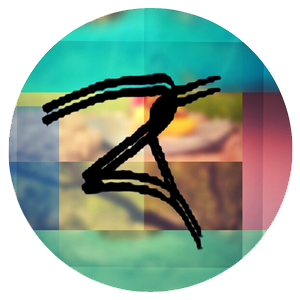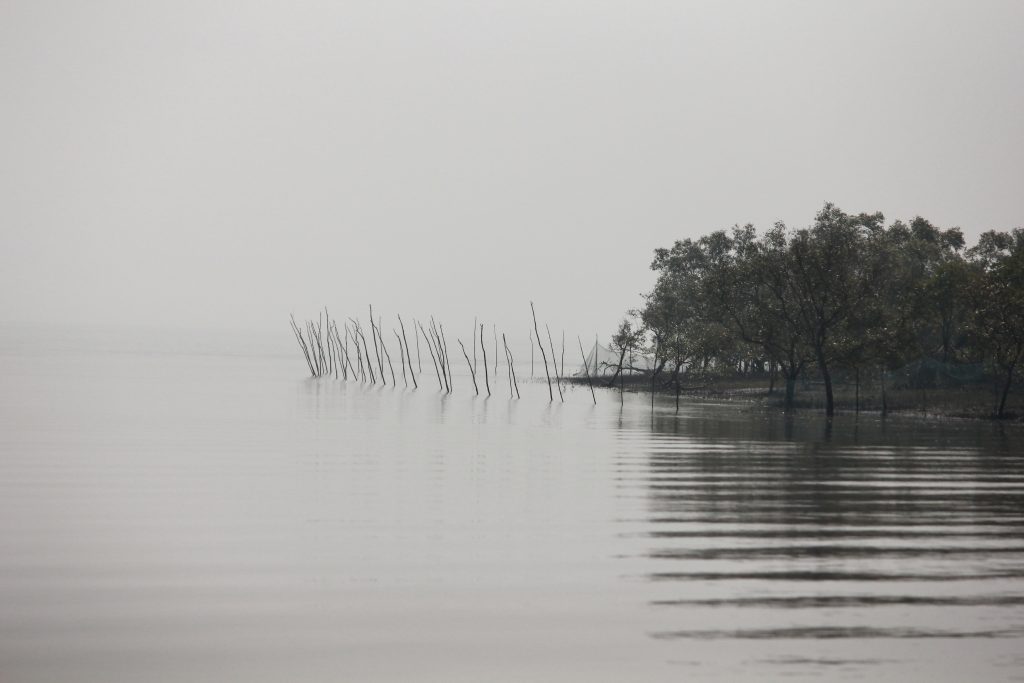“If you think you can grasp me, think again:
my story flows in more than one direction
a delta springing from the riverbed
with its five fingers spread.”
– from “Delta” by Adrienne Rich
Many roads, creeks and channels led into Delta Lives. Every time we visited the Sundarbans delta, we would find parts of key jetties broken. On our last visit, we had sat on the lowest step of a jetty that led to the river and recorded the lap-lap of the small waves flowing over our feet. We had walked along the embankments watching boats sail by catching the soft and brilliant morning sunlight that plays on the waters. This time, however, we had to take a different course. The waters, after all, keep swallowing the mud soil and regurgitating it somewhere else. Caught in the eddies, jetties crumble.
The lives of the people who inhabit this delta are often as fluid when it comes to livelihoods on the island. Many have overlapping season-specific occupations. They are simultaneously fishers, farmers, honey gatherers, local cooks, sailors, theatre performers, craftspeople, carpenters and musicians. Their dwellings are makeshift and their lives have to be rebuilt after extreme weather events and weather conditions.
The ecologically fragile islands are at the forefront of climate crises and hence, living on the deltas are also marked and fuelled by change. While changing physical inroads into the deltas, we had also taken different routes to cover the many facets of life and living on the Sundarban delta. We explored the fishing livelihoods of the islanders through a project funded by the West Bengal Biodiversity Board between 2018 and 2020. We communicated the lack of access to proper healthcare facilities locally in this project developed during the IUIF Fellowship 2020-21. The field research laid bare gender inequities and diminished access to medical care post climate disasters and global medical crises like the Covid-19 pandemic. In 2021, we spent some days with the (women) performers in Dayapur, learning about their movement practices, indigenous language, and private and public lives as mothers, daughters, cooks, fishers, singers, songwriters and dancers. We also co-created some movements with them through Those Who Also Dance (work-in-progress).
History of habitation in the Sundarbans delta has been inconsistent and always at the mercy of the ebb and flow of the tides, with islands disappearing and appearing. All this while, we were looking to build a framework, which would do justice to the fluid and regenerative lives of the islanders. We were toying with names knowing there’s a lot in a name, and once we hit on the right name (what felt right to us!), the project/model would take a course of its own, even if it is a free-flowing multi-directional course like “a delta springing from a river bed with its five fingers spread.” (how Adrienne Rich defined the delta in poetic terms) We’ll deep dive into the naming of Delta Lives in another post.
But what program would accommodate and host (even if for a few months) a project which is as open-ended, free-flowing, multimodal, intersectional, participatory and co-creative while being rooted to the cause of addressing social and gender inequities as Delta Lives? Some online searches later, in July 2021, we came across this Call for Applications on the Goethe Institute – Mumbai website.
“C3: Codes, Creativity, Communities invites applications from artists, musicians, filmmakers, writers, coders, and creative cultural practitioners from all fields. The program aims to build on and contribute to existing open-source knowledge platforms and resources, to extend existing communities, networks, platforms, and databases with a collaborative approach, and to move towards innovation efficiently.”
“C3 focuses on organic development of creative ideas and processes. It intends to be a safe space for practitioners to collaborate, ideate and develop ventures. The program seeks to enable easy yet structured sharing of ideas by working with open-source principles, to lend itself to creating synergies across disciplines, and to build on existing projects without reinventing the wheel.”
There were a few criteria that projects had to meet to become eligible for a C3 grant. The projects had to have open-source elements, be collaborative in nature and address a civil society concern. We pitched Delta Lives for the C3 fund because we resonated with many of the values and principles on which C3 was being built, and we were in for a pleasant surprise.
Since December 2021, we have won two grants (the seed and the top-up) from the C3 program (funder: Goethe Institute – Mumbai). In regular online review sessions organised as part of the program, we have listened to feedback from mentors from the Goethe Institute, BeFantastic Team (Bengaluru) and ZKM (Karlsruhe) and participants from the C3 cohort about our project. These have helped us reflect on the project and plan the next steps.
In our subsequent blog posts, we will look back to the days of trial and error, planning, naming, renaming, pitching, proposing, taking off, stepping back, and look forward to the lineup of events and activities for the next few months. We hope you will join us as we invite the delta lives online.

